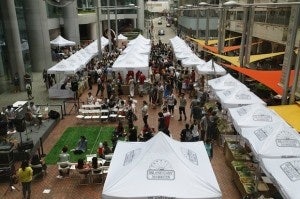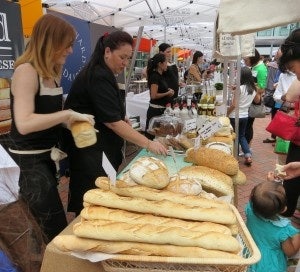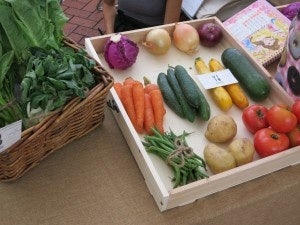“I Have Always Just Written What I Think Is Worth Talking About”#

Hong Kong-based writer, editor, and food blogger/critic extraordinaire
Janice Leung#
keeps her plate full and her readers hungry for more as she zips through life, stomach first, documenting her global travels and eats on her acclaimed food blog "e_ting the world." As if she wasn’t busy enough, Leung -- with co-founder
Vincent Poon#
, the man behind Festival of Restaurants -- is now proving herself an influential force in Hong Kong’s food industry with the recently opened
Island East Markets#
, a (soon-to-be leading) farmers' market at Taikoo Place.
Sponsored by Swire Properties Island East, Miele, Le Creuset, Entendre Studies, and the WOM Guide, the first installments of Island East Markets were held on September 30 and October 7, with two more set to take place on October 14th and 21st.
To learn more about her latest venture, Hong Kong’s happening food scene, and her experience as a blogger, Jing Daily recently caught up with the refreshingly honest and witty Janice Leung for a Q&A:
Jing Daily (JD): Blogging has become a global sensation over the past decade, but how would you describe the blogging community in Hong Kong?#
Janice Leung (JL)#
: It's a burgeoning scene, and it's great that media has been democratized in a sense. On the flip side, it means that there is a huge range of quality of opinion being broadcast -- from brilliant to downright horrific. As with any free market, however, eventually the cream will rise to the top.

JD: As a food blogger among hundreds in such a competitive city, how do you keep your voice and maintain your reputation amidst all the noise?#
JL:#
I can't say it's my aim to "compete" with other bloggers, I have always just written what I think is worth talking about, and stayed true to my own voice.
JD: Since you started your blog, Hong Kong has transformed, as has its culinary scene. In your eyes, what has changed the most, food-wise, in the city? What has gained more of a presence and what has faded into the background?#
JL#
: People are more aware of places like dai pai dongs (open-air food stalls) and cha chaan tengs (HK-style cafés), and nowadays those who go digging for the best yin yang (coffee and tea mixed together, a cha chaan teng specialty) are as much respected as those who fine-dine. Back in the day, it was all about showing off how much foie gras you ate, and today, there is still that element of showmanship, but it can be about things that are more down-to-earth.
I also love that restaurateurs, chefs and diners are all starting to care more about the provenance of ingredients.
JD: What would you identify as the most coveted areas in Hong Kong for hardcore foodies?#
JL#
: To be "coveted," I suppose it has to have an element of [being] "hard to reach." In that case, probably farms deep in the New Territories that have private kitchens. These are rarely advertised and are pretty much purely word-of-mouth.

JD: What would you say are the most exciting food spots in your neighborhood?#
JL#
: Sadly, the most exciting spot, a mom n' pop cha chaan teng right below my house, has closed recently. I live in a typical MTR-mall-residence kind of complex. The food offerings are ridiculously poor.
JD: What inspired Island East Markets? Where would you say Island East Markets stands in relation to the greater organic movement in Asia/the world?#
JL#
: Island East Markets came about almost purely because of need. Late last year, I had just come back from a big coast-to-coast US trip, plus a short jaunt to Europe to eat at
Noma#
(the world's number one restaurant, according to the San Pellegrino World's 50 Best Restaurants rankings). In the US, farmers' markets are abundant and firmly rooted in some communities, and Noma made me think hard about what we could eat locally. So I arrived back in Hong Kong, looking for local farms and farmers' markets. I found that there were quite a number of organic farms, that Hong Kong had its own certification body and that there were farmers' markets.
The latter discovery took me to what was Hong Kong's largest farmers' market in Tai Po. It took me more than an hour, one-way, to get there from my house. It didn't make sense to me that people were buying from supermarkets organic vegetables that are flown in from overseas and sold at ridiculously inflated prices. People in urban areas had almost no access to produce that is being grown locally.
In Asia, people are generally used to shopping and cooking with fresh produce, which is a great start (compared to say, the US). The awareness of how this produce is being farmed, however, is low. Some farmers may be using traditional, sustainable crop-rotation methods, while others might be using fertilizers and pesticides heavily. Consumers don't think about these enough. Around 99 percent of food in Hong Kong is imported, a lot of it from mainland China. With the number of food safety scandals in recent years, awareness of provenance has been raised to an extent. The relationship between produce and one's body is better understood than the relationship between produce and the environment. How we grow enough clean, safe food to feed the world, for instance, is hardly talked about in Hong Kong, or from what I can tell, elsewhere in Asia.
"Organic" as a label is reaching a critical point in development in the US -- there is now talk of "big organic" and so on. I feel that in general, the public is better informed about these matters, and that these are prominent topics in the public forum. In Hong Kong that's not the case; the market for organics here is still nascent, and a lot of education about how to make an informed decision is necessary.
JD: How have the local community and restaurants responded to your project? Is Island East Markets collaborating with any restaurants in particular?#
JL#
: The response from the local community has been amazing. Tens, even hundreds, of visitors to the market are asking if we'll be a permanent fixture, and the number of emails, Facebook messages, tweets and so on have been astounding. It's given us a lot of encouragement.
I believe we've brought some good business to the surrounding restaurants, as the area is usually fairly quiet on Sundays (it's predominantly a commercial area). Restaurants involved include Classified (Press Room Group, who have a restaurant The News Room on the same street as the market), Bright View (El Grande Concepts, who have a restaurant, Grappa's, also on the same street), Chaiwanese cafe which is nearby, and Taverna del Mar, which is also nearby.

JD: We know Hong Kong is a major wine consumer market, but we’ve also noticed a burgeoning local winemaking scene in Hong Kong. Have you heard much about that?#
JL#
: Eddie McDougall from
the Flying Winemaker#
in particular has caught my attention -- he's very dedicated and enthusiastic about winemaking and wine in general, and is doing a lot to make wine appealing to younger drinkers.
JD: In your opinion, what are the current food trends in Hong Kong that you find most interesting/inspiring? Which do you think have the potential to last, and which are a passing fad?#
JL#
: Sustainable eating and knowing where food comes from is on the rise. I don't see that as a fad, because it has real, lasting consequences on society. Hong Kong is also seeing a bit of a Latin American and Spanish wave at the moment, that's just one of those things that will pass, like the ramen craze earlier. Like all fads, only the best (or best value) restaurants will stay standing.
It's great that we can finally get a taco in Hong Kong, and people are learning about molé and so on.